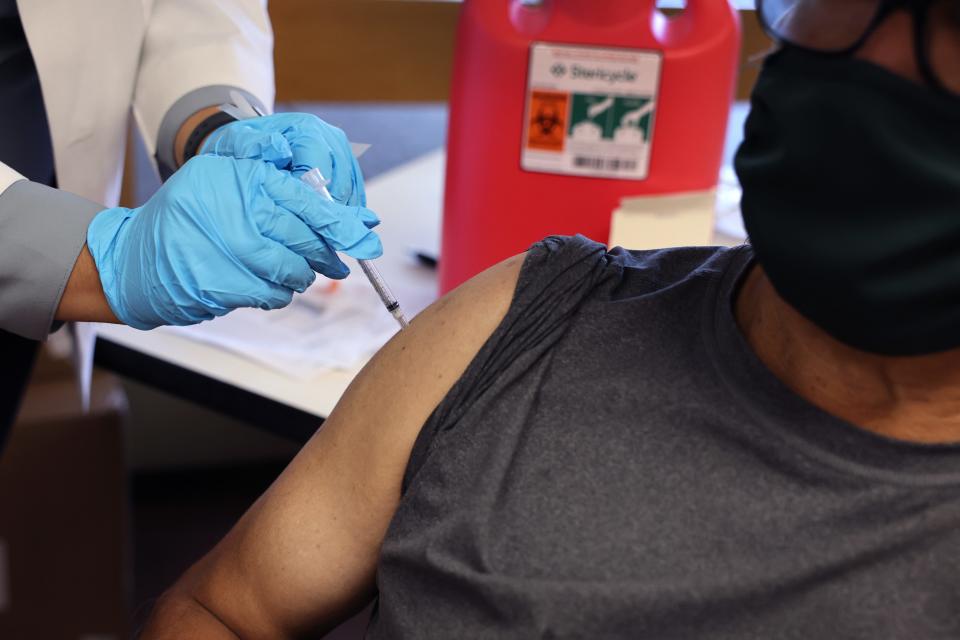Updated COVID vaccines and flu shots recommended for fall: CDC panel
People 6 months old and older should update their COVID-19 and flu shots this fall, the Centers for Disease Control and Prevention announced Thursday.
The unanimous vote by a CDC advisory panel indicates that, for the foreseeable future, the federal health agency’s public health guidance on the SARS-CoV-2 pandemic will be akin to its take on other respiratory illnesses, such as seasonal flu and respiratory syncytial virus (RSV). The CDC’s Advisory Committee on Immunization Practices (ACIP) also recommended routine seasonal flu shots for people ages 6 months old and older to target three influenza A strains dominant last winter season.
“Our top recommendation for protecting yourself and your loved ones from respiratory illness is to get vaccinated,” Dr. Mandy Cohen, CDC's director who endorsed the recommendations, said in a statement. “Make a plan now for you and your family to get both updated flu and COVID vaccines this fall, ahead of the respiratory virus season.”
Know a friend: Why are people suddenly getting COVID-19 this summer? Insight into the uptick.
Over four years into the COVID-19 pandemic, fewer people are getting new vaccines. Less than a quarter of American adults received the latest COVID-19 shot as of May, CDC data showed. Panelists expressed concern that the CDC’s Bridge Access Program, which provided free COVID-19 vaccines to uninsured or underinsured people, will end in August before the rollout of the updated COVID-19 shot.
While the case count is nowhere near as high as in 2020 or 2021, the virus has continued to mutate to survive, and the U.S. is currently seeing an uptick in cases with new sub-variants. COVID-19 and the flu should be taken seriously, the agency said. In 2023, over 916,300 people were hospitalized with COVID-19, and 75,500 died from the disease, according to the CDC. By contrast, nearly 45,000 people died from flu complications in 2023.
The CDC said people who got the last COVID-19 vaccine showed increased protection against emergency room and hospital visits compared with people who had no shot. The COVID-19 vaccination also reduces the risk of developing long COVID which can develop after a severe illness.
Updated vaccines give targeted protection since immunity from a previous shot or infection decreases over time. The last vaccine targeted a specific variant, necessitating a new vaccine that could target newer dominant strains. When ACIP last met in February, it recommended that adults 65 and older receive a booster of the fall 2023 version of the vaccine.

Health experts believe COVID-19 is here to stay. Getting a dose of the updated vaccine before anticipated spikes in the virus during the winter can help prevent illness and serious complications from COVID-19.
“The virus isn’t over,” said Dr. Paul Offit, director of the Vaccine Education Center at Children’s Hospital of Philadelphia and a member of a Food and Drug Administration panel that recently advised which COVID-19 lineage to target for the new vaccines. “This virus will now join other respiratory illnesses that cause hundreds of thousands of cases and tens of thousands of deaths every year.”
Offit added that people in higher-risk groups should consider getting vaccinated to avoid serious illness or death. This includes people 65 and older, immunocompromised people and pregnant women.
In March, the CDC issued updated COVID-19 isolation guidance that is more in line with its advice about other respiratory illnesses. The rationale is that COVID-19 spreads and causes diseases in the same way that seasonal flu and RSV do. The CDC on Wednesday also updated its guidance for RSV vaccines for people 60 and older. People who are 75 and older should get the RSV vaccine, and people between 60 and 74 should get the shot if they face an increased risk of RSV due to lung or heart disease or other chronic medical issues, or if they live in nursing homes, the CDC said.
The public may have become confused by the number of recommended vaccines, said Dr. Steven Furr, president of the American Academy of Family Physicians, an organization with a non-voting role on the ACIP. Part of the idea going forward is that public health professionals would establish a routine cycle of vaccines, so people can acclimate to immunizing against COVID-19, he said.
“We’ll kind of get everybody in a regular pattern,” Furr said. “They can understand that every fall, I’ll get my flu vaccine (and) I’ll take my COVID update.”
In early June, an FDA advisory panel recommended vaccines target the JN.1 lineage of SARS-CoV-2. JN.1 which dominated cases this past winter, though its sub-variants – known as FLiRT are named for genetic mutations – have now led cases. In an update, the FDA recommended vaccine manufacturers also target the JN.1 sub-variant KP.2.
The updated COVID-19 vaccine is expected in August or September.
This article originally appeared on USA TODAY: Get an updated COVID-19 vaccine, flu shot this fall: CDC panel
